In this mid-September, two events came to the forefront of the news that are exchanged in the village: The fires and the hyenas
Some people think itís one of the plagues in Africa, but itís a well-established tradition.
The reasons may vary, they can actually be beneficial for vegetation as we will see.
![]() National parks, like the one near
Kilosa called Mikumi park, burn the grass at the beginning of the dry
season so that tourists can see the animals from afar. It also prevents
dense areas of forest, whether it is gallery forests or woodland
savannahs. The fires are obviously controlled, each area being burned one
after the other. This allows the plants to grow back, with small clumps of
grass being preyed upon by herbivores.
National parks, like the one near
Kilosa called Mikumi park, burn the grass at the beginning of the dry
season so that tourists can see the animals from afar. It also prevents
dense areas of forest, whether it is gallery forests or woodland
savannahs. The fires are obviously controlled, each area being burned one
after the other. This allows the plants to grow back, with small clumps of
grass being preyed upon by herbivores.
![]() Australian studies show that trees are
so used to fire that they have to be exposed to flames in order to live.
In some cases, even seeds must be exposed to intense heat to germinate at
the beginning of the rainy season.
Australian studies show that trees are
so used to fire that they have to be exposed to flames in order to live.
In some cases, even seeds must be exposed to intense heat to germinate at
the beginning of the rainy season.
![]() The slopes are set on fire to clear
the road, as well as the fields so that we can prepare the ground for the
next season. This is a slash-and-burn method even if originally the crop
on fire consists of clearing by fire and then respecting a long fallow
period after harvest. Slash-and-burn farming is associated with shifting
agriculture, including clearing or clearing a forest plot.
The slopes are set on fire to clear
the road, as well as the fields so that we can prepare the ground for the
next season. This is a slash-and-burn method even if originally the crop
on fire consists of clearing by fire and then respecting a long fallow
period after harvest. Slash-and-burn farming is associated with shifting
agriculture, including clearing or clearing a forest plot.
Swidden agriculture consists of the root-stripping with clods of earth (in Gaulish gobbo the earth clod, in Poitevin gobuis) and then burning them. The ashes are then spread on the ground.
The problem is the dispersion of nutrients into smoke, which can land hundreds or even thousands of kilometres away. The other incidence is the destruction of earthworms and mycorrhizal fungi that help plant growth, particularly in nitrogen fixation (source Wikipedia).
The area is wet and fertile, so there is little fallow land. It is even smaller and smaller due to population growth, with some plots now being cultivated every year. The abundance of uncultivated vegetation makes this burning technique attractive to ease tillage. Some are remedying the loss of fallow by using chemical fertilizers.
![]() The mountain slopes are set on fire
for hunting. Not to stand upstream of the flames and shoot anything that
moves, but to clean the area and then hunt with the dogs when the grasses
have slightly reared. These are the fires on hillsides or under the cover
of forests.
The mountain slopes are set on fire
for hunting. Not to stand upstream of the flames and shoot anything that
moves, but to clean the area and then hunt with the dogs when the grasses
have slightly reared. These are the fires on hillsides or under the cover
of forests.
To set fire, a childís play
Ponsiani cleaned up a plot on the other side of the river, this small stream called Chole. The fire was controlled over a small area, and the width of the stream was to prevent any spread across the river. But one of the children, six years old, thought it was right to set fire to side of the hamlet. There was a small wind, turning, which allowed the fire to spread quickly to the houses. It went up the hillside and we had to surround it by wetting the path that allows to climb to the top, this path becoming a fire barrier. The hose allowed to approach the water source near the hamlet, to fill buckets and watering cans.
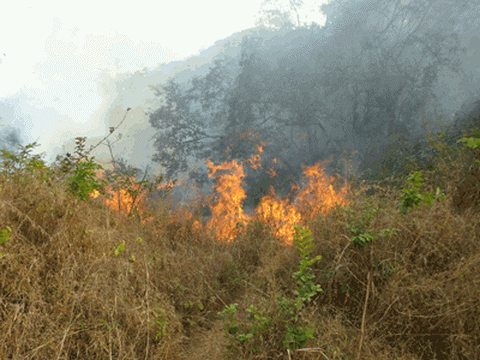
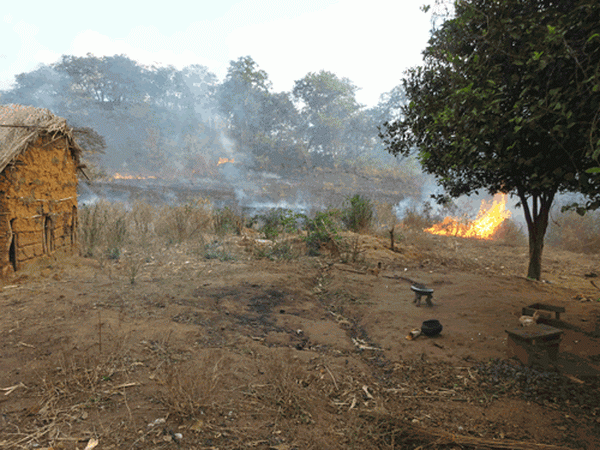
At the bottom left, the source of fire, on the other side of the
river.
The fire came to the edge of the houses and ravaged the hill
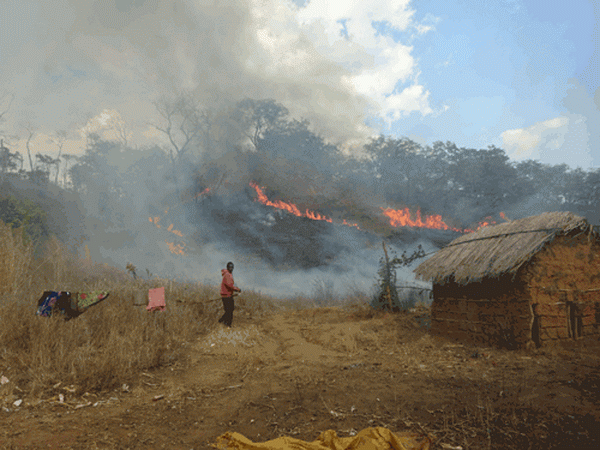
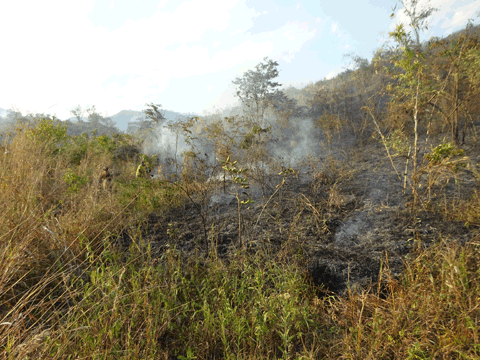
The fire climbs up the hill Luka, in yellow T-shirt, is watering the fire
I asked if the child was going to be beaten:
- No, itís forbidden. He will be hit with words only. A child who is beaten does not learn.
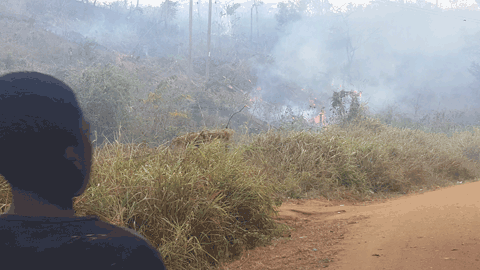
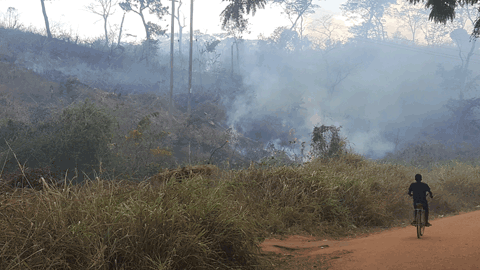
By the road in King'wenyu.
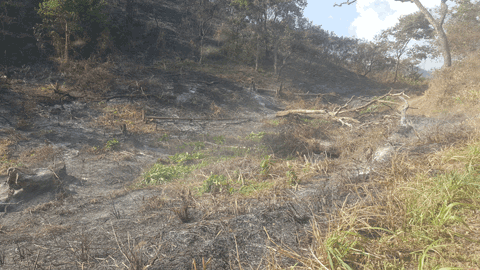
A field cultivated on fire after the trees were cut down at the
top of Jumbebibi, before the pass leading to the Chole valley.
Last week the Masai cattle herds were attacked by hyenas. This was on the side of Ndete, the district of Chabima near the river Nudkwi which borders the forest reserve on the road that leads to Kilosa.
Six cows were slaughtered, the meat sold the next day to the village for a derisory price. This represents Tsh 600,000 or 200 euros per head, a good loss anyway. No one in the village seems to be sad, as the Masai are illegally invading the land of the village. The area is an agricultural area, they are not allowed to graze their livestock there.
Last Thursday I met two herds on the road, at King'wenyu, just before the village. Pointing out to the shepherds that they were not allowed to be on these lands, they argued that they had now set up camps here and there, and therefore they were at home.
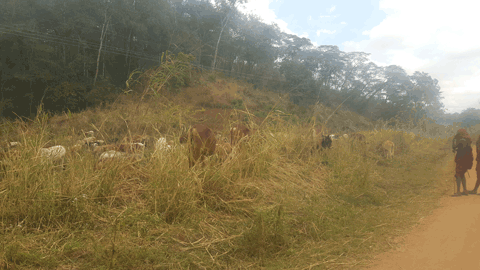
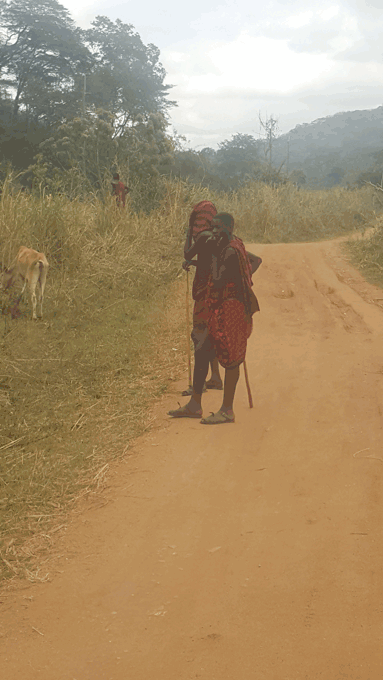
Masai in King'wenyu, shamelessly grazing their livestock on
agricultural land
The problem is the inaction of village leaders, and a
conversation about the Masai cannot end before concluding that the
authorities are being bribed by pastors.
The day before yesterday another cow was attacked by a hyena. These
predators do not pose a threat to humans as long as they can find such
prey. They actually follow the herds.